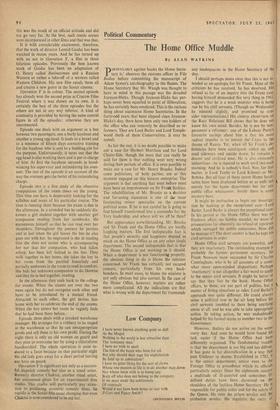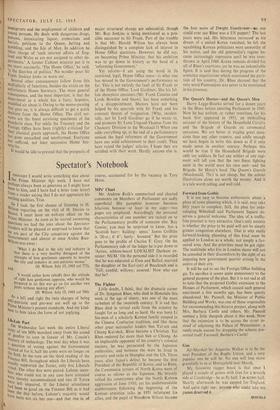Political Commentary
The Home Office Muddle
By ALAN WATKINS
PARTICULARLY against books the Home Secre- r tary is,' observes the customs officer in Vile Bodies before committing the manuscript of Adam Symes's autobiography to the flames. The Home Secretary that Mr. Waugh was thought to have in mind in this passage was the dreaded Joynson-Hicks. Though Joynson-Hicks has per- haps never been equalled in point of illiberalism, he has certainly been emulated. This is the curious thing about successive Home Secretaries. In the forty-odd years that have elapsed since Joynson- Hicks's day, there have been only two holders of the office who can remotely be described as re- formers. They are Lord Butler and Lord Temple- wood (both of them Conservatives. it may be noted).
•
As for the rest, it is no doubt possible to make out a case for Herbert Morrison and for Lord Chuter-Ede, though the most that can really be said for them is that nothing went very wrong during their periods of office. It is even possible to make out a case for Mr. Henry Brooke. Indeed some politicians, of both parties, are at this moment engaged on this bizarre enterprise. The argument is that anything that went before must have been an improvement on Sir Frank Soskice. The rehabilitation of Mr. Brooke as a decisive and far-seeing statesman is one of the most fascinating minor spectacles on the current political scene. If he is not careful he is going to find himself transformed into a contender for the Tory leadership, and where will we all be then?
But appearances notwithstanding, Mr. Brooke and Sir Frank and the Home Office are hardly laughing matters. The first indisputable fact is that people's security and happiness depend as much on the Home Office as on any other single department. The second indisputable fact is that the Home Office is not working as it should. When a department is not functipning properly, the obvious thing to do is blame the minister concerned. Sir Frank has certainly not escaped censure, particularly from his own back- benchers. In most cases, to blame the minister is not only obvious but also correct. In the case of the Home Office, however, matters are rather more complicated. All the indications are that what is wrong with the department far transcends any inadequacies in the Home Secretary of the day.
I should perhaps make clear that this is not in- tended as an apologia for Sir Frank. Most of the criticism he has received, he has deserved. His refusal so far of an inquiry into the Evans case, having himself demanded this very thing in 1961. suggests that he is a weak minister who is being run by his civil servants. (Though on Wednesday he relented slightly, and promised to con- sider representations.) His clumsy about-turn on the Race Relations Bill shows that he does not know his own mind. Besides, he is not by tem- perament a reformer: one of the Labour Party's favourite sayings about him is that his most radical impulse is to restore the Czars to the throne of Russia. Yet, when all Sir Frank's de- ficiencies have been catalogued, added up, and read sideways and upside down, he remains a decent and civilised man. He is also extremelY industrious— he is reputed to work until two each morning. And he is nobody's fool. Nor, for that matter, is Lord Tenby or Lord Kilmuir or Mr. Brdoke. But all four of these recent Home Secre- taries have been displayed before us as unfit not merely for the home department but for anY public office whatsoever. Surely there is some mystery here.
It might be instructive to begin our investiga- tion by looking at the exceptional case—Lord Butler. Lord Butler is always the exceptional case. In his period at the Home Office there was no Enahoro affair, no Soblen scandal, no wave of prosecutions for obscenity, no refusal of reprieves which outraged the public conscience. How did he manage it? The short answer is that he kept his civil servants in order.
Home Office civil servants are powerful, and they are reactionary. The outstanding example is probably the former permanent secretary, Sir Frank Newsam (now succeeded by Sir Charles Cunningham. who is by all accounts of a some' what more open-minded disposition). Perhaps 'reactionary' is not altogether a fair word to applY to the senior civil servants. It might be better to say that they live by the book. Home Office affairs, to them, are not part of politics, but a matter of fitting situations to rules. Lord Butler's approach was quite different. He could always sense a political row in the air long before his civil servants tumbled to there being anything amiss at all; and he was able to take appropriate action. In taking action, he was undoubtedly helped by his formal status as number two in the Government.
However, Butlers do not arrive on the scene every day. And even he would have found his task easier if the Home Office had been differently organised. The fundamental trouble is that the department is too big and too diffuse. It has gone in for diversification in a way that puts Unilever to shame. Established in 1782. it is the senior department, senior even to the Foreign Office (a precedence which its officials particularly enjoy). Since the eighteenth century a multitude of ill-assorted and sometimes ill' defined duties have been showered on the
shoulders of the luckless Home Secretary. He is responsible for public order and for the safety of the Queen. He runs the prison service and the probation service. He regulates the entry of immigrants and the employment of children and Young persons. He deals with dangerous drugs, Poisons, intoxicating liquor, cremations and burials, petitions to the Queen, betting and gambling, and the Isle of Man. In addition he takes charge of 'such internal affairs of Eng- land and Wales as are not assigned to other de- partments.' A former Cabinet minister put it to me more succinctly. 'The Home Office,' he said, `,Is the dust-bin of politics.' No wonder poor Sir Frank Soskice looks so worn out.
Several other consequences follow from this Multiplicity of functions, besides the strain on the unfortunate Home Secretary. The most general consequence, and the most important, is that the department as a whole has a fusty, hopeless, Muddled air about it. Owing to the memo-passing that goes on, it is always difficult to get a quick decision from the Home Office. The civil ser- vants are the finest surviving specimens of the mandarin class. For while the Treasury and the r°reign Office have been (rightly) criticised for their classical greats approach, the Home Office has gone unscathed and unreformed. Everyone has suffered, not least successive Home Sec- retaries.
It would be idle to pretend that the prospects of major structural change are substantial, though Mr. Roy Jenkins is being mentioned as a pos- sible successor to Sir Frank. Part of the trouble is that Mr. Harold Wilson has always been distinguished by a complete lack of interest in Home Office questions. However, he did say, on becoming Prime Minister, that his ambition was to go down in history as the head of a `reforming Government.'
Yet reform—I am using the word in its restricted, legal, Home Office sense—is what one has missed in the Government's performance so far. This is not entirely the fault of Sir Frank or of the Home Office. Lord Gardiner, like his fel- low showpiece amateurs (Mr. Frank Cousins and Lords Bowden and Snow), has been something of a disappointment. Matters have not been helped by his quarrels with Sir Frank and his constant threats of resignation. (Why, inciden- tally, not let Lord Gardiner go if he wants to, and promote Sir Lynn Ungoed-Thomas from the Chancery Division to the Woolsack?) When one adds everything up, at the end of a parliamentary session the legal reformers of the Government have one solid achievement to their credit. They have raised the judges' salaries. I hope they are satisfied with their work. Hardly anyone else is.















































 Previous page
Previous page